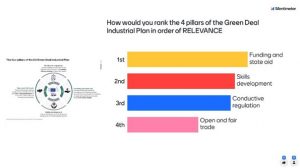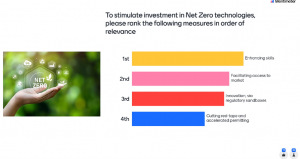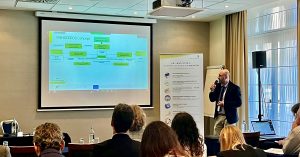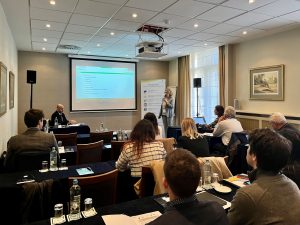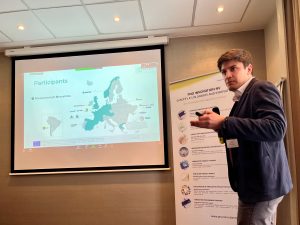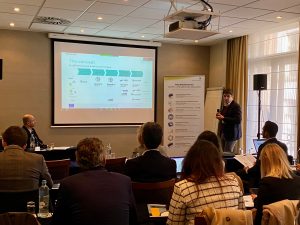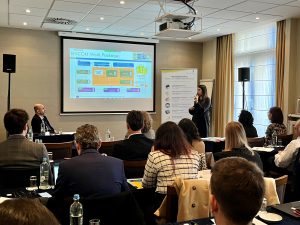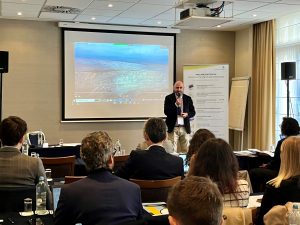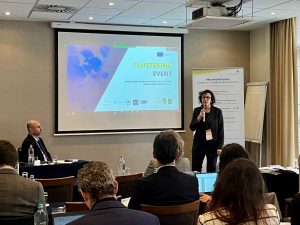News
Europe stands at a turning point in its journey towards establishing a competitive European value chain for batteries. Important steps have been taken in encouraging battery manufacturing plants, only to mention here the inauguration of the first gigafactory by Northvolt in Sweden. Yet, the market demand for batteries continues to surge, fueled not only by the electric vehicle sector but also by other mobility applications and stationary storage needs. The recently launched Quarterly EU Electricity Market Report Q3 ’23 indicates over 600,000 new battery electric vehicles (BEVs) were registered in Q3 ’23, 36% higher than the corresponding quarter in 2022 and counting for 24% market share.
In response to these record demands, the European batteries research and innovation (R&I) community has been dedicated to supporting the establishment of this industrial value chain in Europe, aided by public funding, including by the European Union. Various R&I projects under the umbrella of the BATT4EU Partnership (established under Horizon Europe Programme in 2021), RHINOCEROS included, are sharing forces within the Cluster Hub “Production of materials for batteries from European resources” to address common challenges.
Motivated by the global geopolitical developments, the strategic role batteries play in achieving Green Deal objectives and the ever-evolving nature of battery technologies, Europe recognises the critical need for strategic alignment among stakeholders. Replacing the BATT4EU SRIA of 2021 and the Batteries Europe SRA of 2020, the 2024 SRIA outlines key strategic actions that the European Batteries R&I Community will undertake to advance collaborative research projects facilitated by the BATT4EU Partnership. Different from the previous strategic agendas, the 2024 roadmap goes beyond specific chemistries, leveraging also the power of disruptive (digital) technologies to advance research across all battery types, including material science, manufacturing and recycling processes.
The new agenda draws on the roadmaps published by Batteries Europe and Battery 2030+, compiling inputs from numerous European battery experts, offering recommendations on short, medium, and long-term objectives. It emphasises the need for coordinated action not only at the European level but also within national and regional programmes.
The 2024 SRIA points to the following six imperatives which are necessary to set the foundations and support a competitive battery value chain in Europe:
• Ensure that (BATT4EU) research results reach gigafactories and the markets, through pilots, demonstrators and improved decision making aided by digital tools.
• Increase the strategic autonomy of Europe by reducing the reliance on foreign critical raw materials by supporting local and circular supply chains and support research into different battery chemistries, including sodium-ion technologies.
• Improve battery affordability to accelerate the green transition and keep the European industry competitive by improving batteries based on materials that are more abundant and pushing for better integration into end-use applications.
• Improve the flexibility of battery manufacturing and recycling systems to reduce lock-in effects and respond quickly to changes in a rapidly developing industry.
• Implement a safe and sustainable by design framework for batteries, which plays to European strengths, and which will help reduce emissions and use of substances of concern, improve safety and allow for the integration of smart functionalities.
• Support the continuity of excellent European battery research and academic-industrial cooperation by improving access to research facilities and pilot lines, use research projects to build up a skilled workface, and by avoiding gaps in research through continued funding, which will bind talented researchers to Europe.
Interested in finding out more information about the recently released SRIA?
BATT4EU Partnership is organising a webinar on 20 March 2024, between 10:00 and 11:30 Brussels time. The aim is to present the official document and to host engaging discussions with the experts behind this publication who will explain how this document will redefine the dynamics for the European battery sector.
Register here
RHINOCEROS attending Shifting Economy Week
From 21 to 25 November 2023, the city of Brussels hosted the Shifting Economy Week, an annual event dedicated to showcasing transformative projects that aim to pave the way to an economy that is low-carbon, regenerative, and equally circular. The 2023 exhibitors’ line-up included, among other regional stakeholders, our partner Watt4Ever (W4E), industrial partner specialised in the development of innovative solutions for energy storage and management. W4E leveraged its presence at Shifting Economy Week to to raise awareness about the importance of circular economy principles in the context of the battery industry.
During the same event, W4E’s CEO, Aimilios Orfanos, was invited to speak at the BeCircular conference, an event dedicated to presenting concrete examples of circular economy approaches put in place by Brussels-based companies. He shared insights from W4E’s experience in developing second-life battery systems for electric vehicles, emphasising their potential benefits in terms of environmental impact and cost savings. Simultaneously, the CEO also highlighted the challenges faced by the industry in implementing circular business models, including regulatory barriers and market incentives.
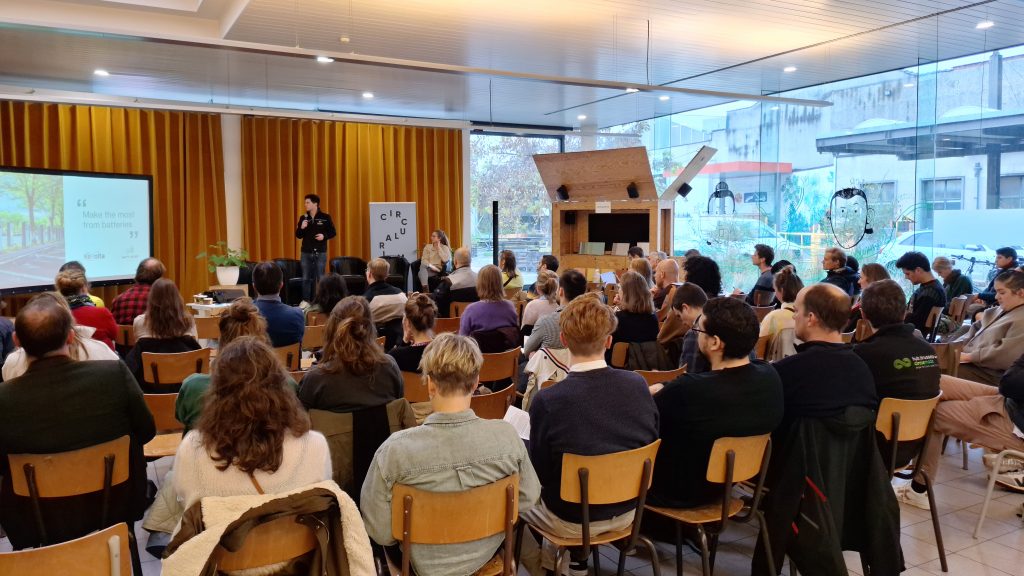
RHINOCEROS at its second participation at Circular Wallonia Days
A few days after attending Shifting Economy Week, W4E represented the RHINOCEROS project at the Circular Wallonia Days, held on 13 and 14 December 2023. Centred around advancing the circularity of the batteries value chain, the event brought together stakeholders from academia, industry, and government to discuss strategies for improving the sustainability of battery production, use, and disposal. The focus topics covered recycling technologies, supply chain transparency, and policy measures to support the transition to a circular battery economy.
© Photo credits: Watt4Ever
On Thursday, 16 November, during the 2023 edition of the Raw Materials Week, the twelve EU funded projects that constitute the Cluster Hub ‘Materials for batteries’ gathered for their annual event in Brussels.
The Cluster Hub has been initiated last year during the 7th edition of the Raw Materials Week. The main objective of the meeting was to meet and discuss the latest developments in the participating projects as well as the new challenges and opportunities discovered through the projects’ lifetime. Nader Akil, Operations Manager at PNO Innovation, inaugurated this second edition outlining the motivation behind the hub’s establishment. He underlined the positive reception and sustained interest from various stakeholders keen on joining this initiative.
Discover and/or rediscover the first edition of the Cluster Hub workshop
Co-organised by RELiEF, EXCEED, ENICON and RAWMINA, the event was also the opportunity to welcome the four new members of the Cluster (EXCEED, RAWMINA, METALLICO and CRM-geothermal). the workshop gathered nearly 100 organisations driving the production and the recycling of raw materials for battery applications from primary and secondary resources.
Building on the initial objective of creating an environment that could foster knowledge exchange on different approaches for the recycling and recovery for battery applications, the event focused on three major topics that depict the transversality characterising the projects: the raw materials through research and science, the roles and challenges of industry and market for raw materials, and the raw materials under the scope of sustainability, durability and social acceptance. During this annual meeting, an interactive session led by Anish Patil from TechConcepts and representing the RELiEF project had the objective of Mapping the European battery material recycling landscape – more details to be found below, in the section referring to the interactive session.
Research and science unlocking new opportunities in raw materials
The first session was moderated by Sonia Matencio from LEITAT, representing the RAWMINA project. This session had the objective of discussing the raw materials through research and science, under the scopes of mining, refining, processing as well as the battery data. Sonia introduced this topic under the scope of RAWMINA, explaining the integrated innovative pilot system for Critical Raw Materials recovery from mine waste in a circular economy context. To this end, Christophe Aucher, from LEITAT as well, highlighted the need on an open battery passport system to better reflect and account for any adaptations that might be required due to the changing regulatory landscape.
Sonia welcomed afterward Brecht Dewulf from KU LEUVEN and representing ENICON, who discussed the sustainable processing of Europe’s low grade sulphidic and lateritic Ni/Co ores and tailings into battery grade metals. The idea behind this was to show all the potential of Ni/Co resources for Europe.
Xochitl Dominguez from VITO concentrated her speech on gas-diffusion electrocrytallisation (GDEx), a crucial topic for the projects LiCORNE and RHINOCEROS she works with. GDEx is an electrochemical process of reactive precipitation of metals in solution with oxidising or reducing agents produced in-situ by the electrochemical reduction of a gas, in a gas-diffusion electrode. This was followed by Katrin Kieling from GFZ Potsdam, working there for the CRM-geothermal project and shortly explained the challenges of extracting critical raw materials from geothermal fluids. To conclude this first session, Sandra Pavón from Fraunhofer IKTS explained the demonstration of battery metals recovery from primary and secondary resources through a sustainable processing methodology in the METALLICO project.
Discover presentations from Session 1
Insights from stakeholder perspectives: Interactive session on key EU Policies and priorities
The annual meeting followed its course with an interactive session led by Anish Patil, which scrutinised stakeholders’ perspectives on the Green Deal Industrial Plan, Net Zero Industrial Act, Critical Raw Materials Act and the European Battery Regulation 2023. Mentimeter facilitated this interactive session, engaging the audience to explore how these policies intersect, complement each other, and identify critical measures and incentives for achieving their objectives.
Over 30 persons participated in the live-poll proposed, which results display the priority to be set on funding and state aid regarding ranking the four pillars of the Green Deal Industrial Plan in order of relevance (followed by skills development, conductive regulation, and open and fair trade). Another major topic regarding the stimulation of investment in net Zero technologies, the majority of answers placed the ‘enhanced skills’ as first priority, shortly followed by facilitating the access to the market.
Lastly, the participants were divided regarding the critical measures to implement in the EU to stimulate investment in building domestic capacities for extraction of critical raw materials (CRMs). Although the majority opted for ‘cutting red-tape and accelerated permitting’, approximately half of the answers evoked uncertainty, which emphasised one more time the need to engage with policy makers as external stakeholders in all projects.
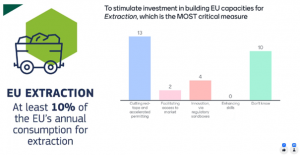
Navigating the nexus: industry challenges, market dynamics, social acceptance and sustainability
This interactive workshop was followed by two sessions, which aimed at discussing the challenges and opportunities of raw materials within the frame of industry and market, as well as the social acceptance, sustainability, and durability.
Alan Gonzalez from PNO Innovation Begium, representing LiCORNE, moderated the industry part, whereas Sam Hoefman from RELiEF moderated the last session on social acceptance, sustainability, and durability. Distinguished panellists took the stage to engage in debates on various topics.
Edvarts Emerson, Production and Testing Engineer at Watt4Ever, presented his work on the benchmark depository of 2nd life use of lithium in batteries, acceptance criteria and guidelines, work developed within the RHINOCEROS project. Benjamin Wilson, representing the RESPECT Project, displayed Aalto University’s work advancing efficient, sustainable, innovative and safe battery recycling processes in the EU. Laura Kainiemi from LUT University, representing the RELiEF Project, Konstantinos Komnitsas from the Technical University of Crete (TUC), on behalf of EXCEED, and Vitor Correia from INTRAW for the CRM-geothermal project, collectively debated the role and impact of social acceptance among affected communities, the importance of triggering new dialogues on responsible mining activities, and the joint involvement of regional, national and European authorities, academia, industry partners, and citizens in shaping these initiatives.
A big thank you to all participants for this co-creative and very constructive and inspiring meeting.
Discover presentations from Session 2
Discover presentations from Session 3
VITO has developed the Gas-Diffusion Electrocrystallisation (GDEx) technology for various metal extraction processes. The GDEx technology utilises gas-diffusion electrodes to recover and synthesise different electrodic materials in the form of precipitates containing the desired metals. This process has shown promising results in metal recovery and selectivity, particularly for different metal extraction process.
The GDEx team has conducted experiments with synthetic solutions to optimise the metal recovery yield and selectivity by investigating the effect of different metal precursor solution to the process. Once the GDEx process is optimised with synthetic streams and the precipitating mechanisms are better understood, the team plans to extend the process to various spent battery waste products obtained from consortium partners. The process will involve precipitation in the form of layered-double hydroxides, and the team will investigate the downstream steps required to obtain recycled battery-cathode material. This is an important step towards sustainable and environmentally friendly practices in the battery industry.
Find out more information about the GDEx process at http://gdex.vito.be
Publication: Synthesis of material libraries using gas diffusion electrodes. Mater. Chem. A, 2020,8, 11674-11686
Between 14 and 18 November 2022, the European Commission organised the 7th edition of the Raw Materials Week, gathering a wide range of stakeholders discussing policies but also relevant alternatives in the field of raw materials. This was an opportune occasion for the RHINOCEROS project to cluster with seven other EU-funded projects at the event “Production of raw materials for batteries from European sources”. The objective of the workshop was to create an environment that could foster knowledge exchange on different approaches for the recycling and recovery for battery applications. Co-organised by CROCODILE, RHINOCEROS and LICORNE, with the participation of the EU funded projects BATRAW, RESPECT, RELiEF, FREE4LIB and ENICON, the workshop gathered nearly 100 organisations driving the production and the recycling of raw materials for battery applications from primary and secondary resources.
Due to the increasing usage of batteries for electric vehicles (EVs) and energy storage systems generated by the EU’s mission to limit climate change, the demand for many metals relevant for batteries is expected to grow by more than 1000% by 2050. Held in a hybrid format, the workshop provided participants with the opportunity to discover innovation routes followed by the clustering projects on their pathway to secure sustainable and responsible sourcing of raw materials for battery production.
Nearly three hours packed with presentations provided stakeholders with essential information about each project, from the main objectives and expected outcomes, to the lessons drawn from the activities carried out.
The CROCODILE project – First of a kind commercial Compact system for the efficient Recovery of Cobalt Designed with novel Integrated Leading technologies– was presented by Dr. Lourdes Yurramendi (TECNALIA). As the most mature project, CROCODILE’s keynote focused on valuable findings and learnings regarding different aspects of the project: the samples treatment, the selection of flowsheets, the life cycle analysis (LCA) and cost (LCC) of the pilot unit, to name only a few. Later on Monday, the project was also featured as a Success Story in the Raw Materials Week, where the presentation video was played for the first time.
Download the CROCODILE presentation
Sonia Matencio Lloberas (LEITAT) presented the BATRAW project – Recycling of end-of-life battery packs for domestic raw material supply chains and enhanced circular economy. This project will develop and demonstrate two innovative pilot systems for sustainable recycling and end-of-life (EoL) management of EV batteries. Depending on the results obtained, these technologies could be extended to other types of batteries to recover all the metals and materials contained: i.e., cobalt, nickel, manganese, lithium, graphite, aluminium, and copper.
Download the BATRAW presentation
Nader Akil (PNO Innovation Belgium) explained the mission and the motivation behind the RHINOCEROS project – Batteries reuse and direct production of high performances cathodic and anodic materials and other raw materials from batteries recycling using low cost and environmentally friendly technologies. As attractive energy storage technologies, Lithium-ion batteries (LIBs) have proven to be a reliable solution, especially when it comes to the production of low-emission fleets (EVs), followed by stationary storage market and consumer electronics. According to the Strategic research Agenda for Batteries, by 2030, the global demand for LIBs is estimated to increase 14 times and the EU could account for 17%. The battery market is expected to reach 250 billion EUR/year by 2025, while the production in Europe is foreseen to rise to 300 GWh/year as of 2030. This generates opportunities for projects like RHINOCEROS to develop economically and environmentally viable routes for re-using and recycling EoL EVs and stationary energy storage Lithium-ion batteries (LIBs).
Download the RHINOCEROS presentation
Similar to the RHINOCEROS project, FREE4LIB [Feasible recovery of critical raw materials through a new circular ecosystem for a Li-ion battery cross-value chain in Europe] aims to simplify the recycling process of LIBs, as a more resilient and environmentally friendly alternative to the current linear economic model – take, make, dispose. The project, presented by Juan Castro (CARTIF), will develop six technologies at TRL5 to achieve new sustainable and efficient processes to recycle EoL LIBs: dismantling, pre-treatment and four materials recovery processes aiming to reach highly efficient materials recovery (metal oxides, metals and polymers). Additional to the recycling solutions, FREE4LIB will also target three processes dealing with metals and polymers re-using and electrode synthesis to re-manufacture new LIBs.
Download the FREE4LIB presentation
Justo Garcia (Orano Mining) presented the RESPECT project. Funded by the Horizon Europe research and innovation programme, the project aims to strengthen expertise in techniques and the value chain for the recycling of electric vehicle batteries at European level. The RESPECT project will develop a global process encompassing a process-chain flexible enough to treat all kinds of batteries in closed loop. Precisely, researchers will explore two recycling routes: full hydrometallurgy and direct recycling, and an improved Life Cycle Assessment of each recycling segment to reduce emissions, health risks and safety issues.
Download the RESPECT presentation
Recently launched, the LiCORNE project – Lithium recovery and battery-grade materials production from European resources, was introduced by Alan González Morales (PNO Innovation Belgium), who explained briefly the project’s ambitious objectives to establish the first-ever Li supply chain in Europe. With five large primary resource owners (including one of the world leaders in Li production) involved in the consortium, the project aims to increase European Li processing and refining capacity for producing battery-grade chemicals from ores, geothermal and continental brines, tailings and off specification battery cathode materials (waste).
Download the LiCORNE presentation
Gabriel Hidalgo, from the Recycling Unit of Avesta Battery & Energy Engineering (ABEE), outlined the objectives and the impact expected from the RELiEF project – Recycling of Lithium from Secondary Raw Materials and Further. Expected to boost the recycling industry, this project aims to reduce Li waste by more than 70%, and to transform recycled resources into high value battery-grade material. Relying on a very diversified consortium, RELiEF will additionally propose a new business model for materials acquisition and processing, taking into consideration environmental and social sustainability.
Download the RELiEF presentation
Sofía Riaño Torres (KU LEUVEN) presented the last EU project, ENICON– Sustainable processing of Europe’s low-grade sulphidic and lateritic nickel/cobalt ores and tailings into battery-grade metals -Launched in June 2022, the project aims to improve the refining capacity of domestic and imported low-grade Ni/Co. ENICON’s metal recovery route using hydrochloric acid dispenses with the old-school hydro-based approach that involves continuously precipitating and redissolving metals. Thus, it reduces the amount of chemicals needed for metal dissolution, which results in the production of potentially harmful waste streams. More information about the project in the joint documentary commissioned together with EU funded project NEMO: Responsible Mining in Europe.
Download the ENICON presentation
The workshop in figures
Although only in its first edition, the clustering workshop Production of raw materials for batteries from European resources attracted a diversified range of stakeholders. Counting more than 150 people registered, the audience was dominated by research organisations (26,97%), the rest of the audience being equally distributed between academia (17,76%), large companies (17,11%), SMEs (16,45%), EU institutions (4,61%) and other stakeholders addressing raw materials – national and regional administrative authorities, logistics service provides, investing companies, trade associations, NGOs, consulting companies (17,76%). Participants are located mainly in Europe but a percentage of nearly 20% shows growing enthusiasm from third countries, such as Turkey, Canada, South Korea, Chile, etc.
Exploring future clustering ideas
With the real peak of valuable outcomes from H2020 projects coming now, the aim goes beyond informing about the progress achieved to date. Building on the knowledge generated so far, new projects need to address different challenges, such as the high cost of exploration activities, the geological uncertainty, and the necessity to develop improved processing and refining technologies for better recovery of minerals and metals from side streams and industrial waste. Such challenges require close collaboration on all levels and across the entire battery value chain.
The last part of the event featured an interactive session, which included seven questions scrutinising stakeholders’ interest for similar clustering initiatives. With favourable answers and reviews, the Production of raw materials for batteries from European resources could turn into a permanent clustering hub fostering knowledge exchange and stimulating synergies between projects. More information will follow soon.
The Cluster Hub “Production of raw materials for batteries from European resources”
After the successful workshop held in November 2022, the participating projects launched in January the cluster hub carrying the same title – “Production of raw materials for batteries from European resources”. The platform is a collaboration-driven community sharing the same mission – to foster the knowledge necessary to drive a more sustainable and circular production of raw materials for the European battery industry.
Photo gallery
